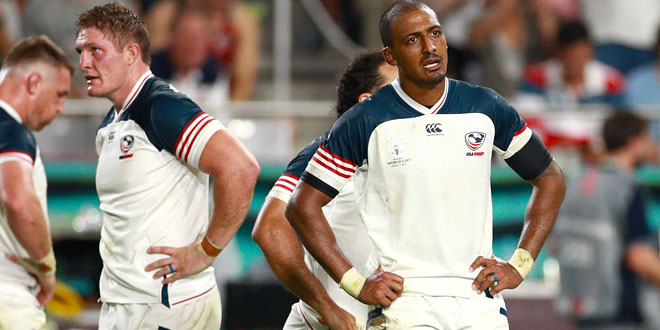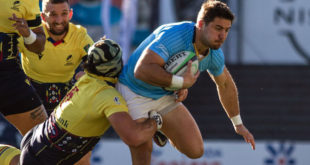Match order is fundamental in sport. Some teams can be eliminated early based on how their matches are distributed. This issue has occurred repeatedly at RWCs. There are a number of reasons for this, none more so than organizers positioning key pool matches at certain points of the pool phase.
Argentina and Italy’s RWC 2003 schedule are two instances. First, Argentina’s fourth pool match was played before England’s third. Los Pumas’ campaign concluded the weekend before Pool A opponents Australia and Ireland met in Melbourne. Second, Italy played 4 games in 14 days. Their final match was played on Saturday, October 25. Their opponents, Wales completed Pool D against New Zealand in Sydney on Sunday, November 02.
Italian Head Coach John Kirwan asked for a fairer schedule. There were improvements; indeed, no RWC since 2003 has had comparable lack of overall rest days or has given certain teams an additional week over others.
There are two lingering issues that reappear form one tournament to the next. First, limited turn-arounds. This problem will not go away unless the RWC is expanded to 24 teams. Second, match order. Scheduling has continued to have flaws since RWC 2003. Addressing the second issue is the objective of this article.
The early scheduling of the draw complicates the problem. A lot can change, rendering the pools inaccurate in terms of distribution. For RWC 2023 nothing can be done to avoid it; the draw has been made.
Pool D of RWC 2003 is a useful example of how not to distribute match order. New Zealand were the odds-on favorites to win the group. In theory, the remaining four could target the second spot. Italy had beaten Wales in the 2003 Six Nations, Tonga had beaten Italy at RWC 1999 and Canada had beaten Scotland in 2002.
Wales and New Zealand were seeded as the top two. Moreover, the top two teams were the last to finish and the top side was also the first to start. Italy and Tonga had the most demanding schedules. New Zealand and Wales had the best while Canada was in the middle. Italy vs Wales on the final weekend would have been an improvement.
This does not apply only to teams competing for the knock-out rounds; it applies to all participants. Consider Japan and Uruguay’s schedules from RWC 2019. On the one hand, the 2019 hosts had a pathway to the play-off’s mapped out. Facing Tier 1 opponents when they did and positioning Ireland and Scotland’s matches as they did advantaged Japan.
Japan opened against Russia (Europe 2), played Ireland second, Samoa (Play-Off Winner) third, and Scotland fourth. Match dates were September 20, September 28, October 05, and October 13. Ireland had two fewer days before game two against Japan. In addition, the match schedule meant Ireland’s toughest two matches were first. They opened against Scotland on September 22. The Scots faced Russia on October 09 and Japan on October 13.
Uruguay’s qualified as Americas 2. Los Teros’ matches were vs Fiji on September 25, Georgia on September 29, Australia on October 05, and Wales on October 13. The first two were identified as winnable games, yet they were positioned in an unfavorable way. The same applies to Fiji and Georgia’s schedules.
Best Scenarios
As noted above different factors determine positive our negative match order for RWC pools. The best scenario differs from one team to the next. For Tier 1 teams match order is paramount; for Tier 2 teams recovery time between games carries greater importance.
RWC 2019 champions South Africa are in Pool B. The group also contains Ireland, Scotland, Asia / Pacific 1 (possibly Samoa) and Europe 2 (possibly Spain). The best scenario for South Africa would come at the expense of either Scotland or Ireland; that being, South Africa face one of them on the final weekend of the pool stage.
Similarly, England are positioned as favorites to win Pool D. A good scenario would have England face both teams in three of their first matches. This would enable Argentina vs Japan to be positioned in the final weekend. If results all went according to rankings and seeding then the South American vs Asian match-up would determine who goes through to the quarter finals and who goes home.
Worst Scenarios
If South Africa vs Ireland were to be at the end of the pool stage then Scotland would experience a match order like that of Italy from RWCs 2003 and 2015. The same can be applied to other pools. If England vs Argentina takes place on the last weekend then Japan, and the pool stage in general, would be disadvantaged.
The worst scenarios would see RWC 2003 examples repeated. For instance, France vs New Zealand, England vs Argentina, and South Africa vs Ireland played on the final weekend. In short, the Band 2 and 3 teams merit priority over Band 1 in the match order.
The worst possible schedule would be for a team to face two Tier 1 sides in-a-row. RWC 2015 demonstrates an extreme example. Japan faced South Africa on September 19 and Scotland on September 23. Later on, South Africa had three rest days between facing Scotland and the USA. The latter scenario is tolerable, whereas Japan’s was not and it could have been avoided.
Fairest Scenario
The fairest match order for RWC 2019 would see Band 2 vs Band 3 matches played on the final weekend. Thus, France vs Italy, Argentina vs Japan, Australia vs Fiji, and Ireland vs Scotland all being played between the final Friday and Sunday of the pool phase.
The match order would see Band 4 and 5’s most winnable matches separated. The schedule would not see a comparable schedule to that of Japan’s in 2015 nor Uruguay’s in 2019. The schedule would also see a spread of games to minimize the number of days without any matches.
There are several decisive Pool A fixtures to determine who plays who and in which order. First, France vs New Zealand is expected to be the tournament opener. Second, the pool is likely to close with France vs Italy. Third, Africa 1 and Americas 1 will prefer their chances against Italy than France or New Zealand. As such, Africa 1 and Americas 1 would be able to prioritize the games under this schedule. This also applies to Italy’s schedule.
England and South Africa are favorites for Pools B and D. The fairest match order for Pool B would see the Springboks playing Ireland and Scotland in two of their first three pool matches. Ireland vs Scotland should be on the final weekend. The same applies for Pool D; Argentina vs Japan should be on the final weekend. Great care will be required to provide the Europe 2, Asia / Pacific 1, Oceania 1 and Americas 2 qualifying teams with attention to adequate turn-arounds between matches.
A notable hangover from 2019 is that Fiji’s first and second matches lacked an adequate turn-around. A solution for RWC 2023 that could add freshness is to have Australia vs Wales on the opening weekend. Fiji’s matches against these teams could be on the second and fourth weekends; comparable to Japan’s 2019 schedule. lastly, Australia and Wales should should have short-turn arounds between a Tier 1 match and their respective games against the Final Qualifying Winner.
| POOL A | POOL B | POOL C | POOL D |
| New Zealand | South Africa | Wales | England |
| France | Ireland | Australia | Japan |
| Italy | Scotland | Fiji | Argentina |
| Americas 1 | Asia / Pacific 1 | Europe 1 | Oceania 1 |
| Africa 1 | Europe 2 | Final Qualifying Winner | Americas 2 |
 Americas Rugby News Rugby news from across the Americas!
Americas Rugby News Rugby news from across the Americas!




